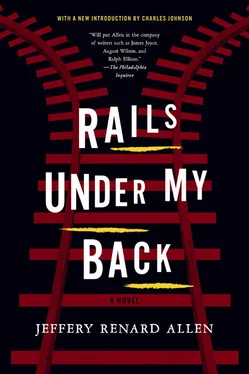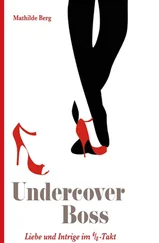How horrible. You saw that and you still came to work today?
I didn’t want to miss a day.
Sheila, you should go right home.
No need to miss a day.
A cuff of water froze her ankle. Lord, I peed on myself. Sheila looked down. Nelly’s wet nose was sniffing at her feet. Nelly, get on away from here. Sheila gave the black fox terrier a light kick to push it away. Nelly inched back to her feet. Nelly was one black ball of short wild hair, like somebody’s napply ole head. Nelly sniffed, wet. Then she started to howl. Shit! Mrs. Shipco ain’t home. Sheila hated when Mrs. Shipco left the house, because Nelly would howl and howl and howl until she returned. Wishful, Sheila checked Nelly’s bowl. It needed no food. Habitually, Sheila would have to slide the bowl directly under the dog’s nose. Nelly could no longer actually see the food. Sheila had been after Mrs. Shipco to have the dog put to sleep. But Nelly was one of the family. Just like Laddie, that old collie, had been. Shipcos musta owned Laddie fifteen years.
Fifteen of our years for one of his years, Sheila said.
No, Sheila, Mrs. Shipco said. He’s twelve.
That makes him — Sheila calculated — one hundred and five.
Not fifteen. Seven years.
So he’s — Sheila calculated — eighty-four.
He’s making it.
Mrs. Shipco had waited until Laddie could no longer walk before she loaded him onto the front seat of the family station wagon and caressed his fur and snout all the way to the veterinarian’s office. Brought Nelly home the same day.
Nelly howled. Sheila’s nerves had tolerated enough. Sheila picked up the dog and tucked it under her arm like a football. Carried it outside and lowered it into the fenced-in pen — oak rails and post — that ran parallel to the two-car garage. Nelly howled once or twice, blinked her unseeing eyes, then curled up on the gravel.
Now I can get some peace. Sheila went back inside.
She retrieved the laundry basket. Dumped the clothes onto the kitchen table. Readied her iron and board. Her hands burrowed into the pile of clothes. Starchy heat massaged her fingers and palms, a warm after-dinner cloth. Her warm hands worked. Backwash flooded her throat, a flake of something dry and nasty. She had a city inside her. An entire kingdom. She had been an hour late today. Eyes had held her back. Eyes that see everything they care to see. Her vision helpless as the image formed itself, upside down, backward, salmon-driving up into the streams of her tears. But your witnessing morning is now a part of somebody else’s memory. You don’t want it. Give it away. You were conscious of shoes, so many different clicking colors, walking by you while you stood and waited, wading in ocean, so much surrounding you. Voices drawing from you, moment to moment. You were conscious of boarding the train, the train moving, jerking to a stop, then moving again. Besides, everything that happens makes sense. So Father Tower used to say. And what happened this witnessing morning — Well, it ain’t anything to miss work over. She has worked for the Shipcos for over thirty years and can count the numbers of days she has missed on all twenty of her fingers and toes.
The first time, she took the day off to mourn President Kennedy’s death. The second time, five years later when the other Kennedy boy was assassinated. That same year, she left work early when Dr. King was assassinated. Maybe King died before the Kennedy boy. So long ago. Memory fools. Kennedy and King. Unformed shapes and sounds in grainy black and white surround the words. Sounds and images faint and indistinct. Did I imagine them? More touch than sight or sound. What holds one funeral from the other? Makes one name, one man, one brother distinct from the other?
I can’t tell you how many times I seen that hotel.
Flitting and fitful points of light flickered on the television screen.
That’s right. Mrs. Shipco gulped down the rising in her throat. You used to live in Memphis.
Used to pass by there almost every day.
After everything else that’s happened, now this.
Sheila understood. Mrs. Shipco would get a certain look when she knew Dr. King was to appear on TV. A faint smile of anticipation would soften her face.
Sheila went home and soaked her feet in Epsom salts. Watched black and gray images burn down the city. She might have joined them but her feet hurt too bad.
She took off for Sam’s funeral, Big Judy’s funeral, and Koot’s funeral. She would take a few days off for Lula Mae’s funeral.
These past few months, she had missed more days than in all the previous years, flying down to West Memphis— outside the window, the shadow of the moving plane toy-small against the white clouds —twice a month to tend to Lula Mae on her white deathbed. Lula Mae’s toenails curved out from under the white sheets, long yellow bird claws. Sheila would remove the sheets. Look right through Lula Mae’s white skin, water. The bones delicate underneath, sprung with tension, the splinters of a collapsed bridge. And further down, the lumps of cancer like river stones. Sheets missing, Lula Mae would awaken. Take one look at Sheila and color would climb high in her bosom, neck, and face.
Sheila would pull back the curtains and raise Lula Mae’s face to the light. Lula Mae would chew the pain and talk until she could talk no longer. Sheila would replace the white sheets. Search for the long scar across Lula Mae’s stomach, the scar she and Gracie — when they were girls — would finger as Lula Mae deep-breathed sleep. The scar had disappeared. Dissolved in memory. The clear white belly mirrored Sheila’s face.
WHEN SHEILA WAS PREGNANT, she hauled the freight of her belly to work. Unimpeded by the weight, she worked while her stomach domed under her blouse. Washing, kneeling, scrubbing. Got rounder each day, so round she thought she would bounce away. Her energy did not subside during labor. Rapid breathing reflected her rushing mind. So much to do with and for a new baby. Sweat spread a blanket of wet weight over her. Her mind and chest slowed. She breathed heavy in the darkness, breath twisting up like smoke. She climbed the smoke up into a white room with a silver sun. Saw the forceps move in position. Pull. Pull. Something long emerged, a brown banana. The baby’s head. Don’t worry, ma’m. We can shape the head. It’s soft like clay. Kids can give you such a scare. She took a day to rest, then gathered the baby up in the pink blanket and hurried out of the hospital. She had never had so much energy in all her life. She could leave Porsha, her firstborn, in the cradle for hardly a minute. The baby lay on its back, the legs and arms pumping outward like a turtle. She took it high and awkward in her arms. It opened its eyes, whimpering. She rocked it. She carried it everywhere in a back sling. Carried it to work, not because she could not find or afford a babysitter, but because the magic had not burned away.
Sheila would awaken — having dozed off in the middle of mopping, dusting, polishing the piano, vacuuming the floors, cleaning the windows, folding the laundry — and find the baby lying in one of the Shipcos’ old cradles, Mrs. Shipco leaning on the cradle’s high rail, and trying to tease out laughs with a rattle.
IVORY BEACH, SHEILA, and Gracie drew water from Daddy Larry’s well — drawing water was women’s work — washed laundry and carried the baskets to town, not on the crowns of their heads as the old folks liked to do, but sack-heavy in front of them. Gracie always fell behind the other two. You, Gracie, Ivory Beach said. I’m older than you and if I can carry mine, then — She meant to say, My basket is heavier cause it’s stuffed full of herbs— beneath the sun-clean sheets —for the white folks in town. Come on here, she said. Ivory Beach didn’t like Gracie. Especially when the sun made Gracie’s birth-black skin three shades blacker, like it did the red summer day Lula Mae went away, watermelon red cause it is the scent of watermelon that always reminds you of that day. Blackbirds should be shot and eaten, she liked to say. Sheila could carry with ease. Labor was buried deep in her nerves and muscles. The three of them white-scrubbed the laundry and carried it to town over the hot sand road, the road that was like a river of heat so you walked in the grass.
Читать дальше












